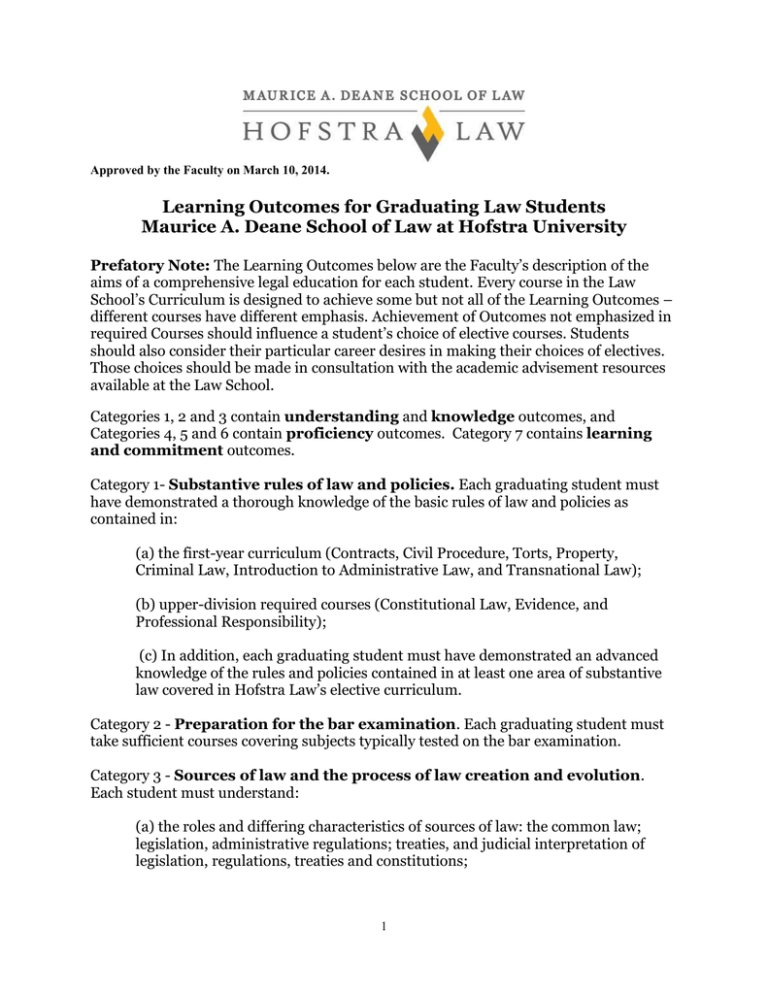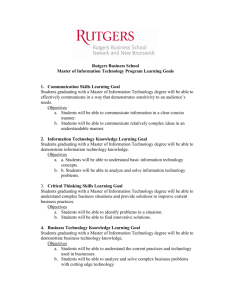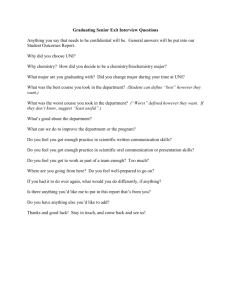Learning Outcomes for Graduating Law Students
advertisement

Approved by the Faculty on March 10, 2014. Learning Outcomes for Graduating Law Students Maurice A. Deane School of Law at Hofstra University Prefatory Note: The Learning Outcomes below are the Faculty’s description of the aims of a comprehensive legal education for each student. Every course in the Law School’s Curriculum is designed to achieve some but not all of the Learning Outcomes – different courses have different emphasis. Achievement of Outcomes not emphasized in required Courses should influence a student’s choice of elective courses. Students should also consider their particular career desires in making their choices of electives. Those choices should be made in consultation with the academic advisement resources available at the Law School. Categories 1, 2 and 3 contain understanding and knowledge outcomes, and Categories 4, 5 and 6 contain proficiency outcomes. Category 7 contains learning and commitment outcomes. Category 1- Substantive rules of law and policies. Each graduating student must have demonstrated a thorough knowledge of the basic rules of law and policies as contained in: (a) the first-year curriculum (Contracts, Civil Procedure, Torts, Property, Criminal Law, Introduction to Administrative Law, and Transnational Law); (b) upper-division required courses (Constitutional Law, Evidence, and Professional Responsibility); (c) In addition, each graduating student must have demonstrated an advanced knowledge of the rules and policies contained in at least one area of substantive law covered in Hofstra Law’s elective curriculum. Category 2 - Preparation for the bar examination. Each graduating student must take sufficient courses covering subjects typically tested on the bar examination. Category 3 - Sources of law and the process of law creation and evolution. Each student must understand: (a) the roles and differing characteristics of sources of law: the common law; legislation, administrative regulations; treaties, and judicial interpretation of legislation, regulations, treaties and constitutions; 1 (b) the processes through which law is made and changed and how those processes differ from one source of law to another; (c) the different roles that state and federal law play in the process of lawmaking; (d) at least some of the perspective analysis of law: economic; comparative; empirical; historical; jurisprudential. Category 4- Writing. Each graduating student must have demonstrated the ability to: (a) write analytically and persuasively; and (b) draft legal documents such as contracts. statutes, client communications, opinion letters and the like. Category 5 - Basic legal analysis, fact development and law-finding. Each graduating student must have demonstrated proficiency in the following: (a) extracting rules and policy from cases, statutes, and administrative regulations and analyzing, interpreting and arguing differing interpretations of rules and statutes; (b) conducting investigation of facts and constructing a coherent narrative based on that investigation; (c) identifying legal issues in facts and applying rules and policy to facts; (d) weighing evidence to reach factual inferences; (e) constructing arguments and identifying flaws in an argument; (f) performing comprehensive legal research; (g) analyzing and structuring transactions; (h) presenting analysis orally and arguing orally; (i) using policy to analyze and persuade. Category 6 - Entry level capabilities: At the level of proficiency required for effectiveness as an entry level lawyer, and in a manner appropriate to a student’s professional goals, each graduating student must have demonstrated proficiency in: (a) strategic planning: developing a plan to accomplish a goal; (b) problem solving in light of a client’s objectives: anticipating consequences and assessing risks; 2 (c) recognizing the most common ethical and professional liability dilemmas and resolving them with high professional standards; (d) negotiating in both dispute and transactional contexts; (e) counseling clients; (f) interviewing; (g) performing basic trial tasks (including using the rules of evidence); (h) using procedural tools such as motions and discovery; (i) utilizing experts and expert knowledge; (j) working collaboratively; (k) learning from experience through self-critique; (l) managing projects within time and resource limitations; (m) presenting orally outside of litigation; (n) using technology in legal practice. Category 7 – Professional Identity and Perspectives. Each graduating student shall learn how to: (a) present written and oral communications and conduct him or herself in professional settings in a manner that meets the standards of the legal profession; (b) conduct him or herself in accordance with standards of professional conduct; (c) fulfill a lawyer’s commitment to competence, integrity, accountability, and social responsibility; (d) apply the principles and policies reflected in the law governing lawyers, including a lawyer’s duty of loyalty to clients, fiduciary duties, and obligation of zealous representation. 3

